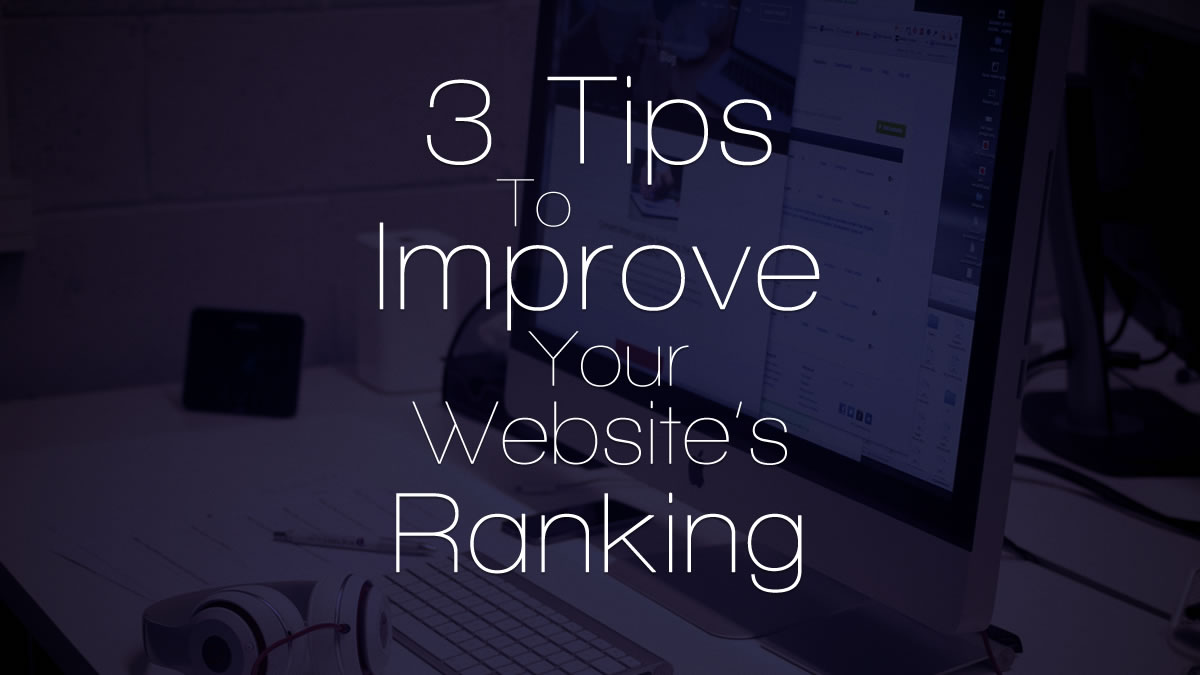3 Tips To Improve Your Website's Ranking
Your website is your business's gateway to the internet. Without it, potential customers might not be able to find your business online. This is why it is crucial to have a successful website.
In this article, we will cover one element of what it takes to have a successful website - that element being how high it ranks within the search engine results pages.
Your website rank is how well it performs within the search engines such as Google, Bing and Yahoo. Many variables determine how well your website will rank, and search engines update their algorithms regularly to ensure the results they return are relevant.
A better rank, can lead to more traffic, more people reading your product descriptions and more conversions. In turn, leading to more sales. I would go as far to say without a decent rank, your website might as well not exist.
So without further ado, let us cover the three main points to improve your website ranking.
1. Content Is King
Our research has shown that the number one area that affects the rank of your website is the content it displays. Your content needs to be appealing, relevant and engaging. This is easier said than done, but with a little research, investment and a good understanding of what people are searching for, you should be able to adapt your content accordingly.
So let us break down these points:
- Be appealing. Your website’s content needs to not only be easy to read, but enjoyable to follow and enticing to interact with. Try breaking down the content into smaller sections to aid with focus. Use lists to make information easier to digest. Or use images to explain potentially complex ideas (yes images can count as content too if used correctly).
- Be relevant. Not only does the content have to be appealing, but also relevant. As without relevance, your content offers very little value to readers. Ensuring the main content matches the headline is a simple guideline to follow. If you are selling footwear, and a page on your website has a headline of “Great Shoes for a Great Night Out”, don’t make the content about house shoes. While we are not saying you cannot have a great night out in house shoes, most people will not associate house shoes with a night out.
- Be engaging. Content needs to engage the reader. Ask readers questions to get them thinking about the subject at hand or prompt them to interact with the website itself. Sticking with the footwear analogy, asking questions like “Do you enjoy jogging with sore feet?” This prompts the reader to answer the question in their head. Even though the answer may be obvious, it gets the reader thinking. The content then can lead on to explain why your shoes reduce the likeliness of sore feet. Or prompt the user to answer a simple “yes or no” poll or comment on the website for even more engagement.
2. Traffic Leads To Traffic
Another area that many search engines consider is the traffic your website is already attracting. It is quite a simple idea: the more people that know of your website, the more people that can tell others about it. However, this can be a catch-22 situation in some cases. Because to get more traffic you need to rank well within search engines, but to rank well within search engines you need to establish a decent flow of traffic.
Fortunately, traffic does not only have to be from search engines. Direct referrals, paid advertisements and social networks all contribute to traffic and can help improve your website's ranking.
Try leveraging other mediums to attract people to your website. Utilise your personal network - people you know in your social circles, such as colleagues, friends and family. Get social by using social networks like Facebook and Twitter to promote your website and products. If you want faster results, you may need to invest and take advantage of paid advertisements.
3. Be Relevant
While we did cover relevance in the “Content Is King” section above. The final area I am going to cover in this post is the overall relevance of your website. Not just the content, but the website as a whole needs to be relevant. This includes things like where your business is located, how long your website has existed, what language your website is in and other key attributes.
Remember, when potential customer searches for a product or service your business offers, search engines are going to look at where the customer is searching from, in what language they are searching and if they are searching for key phrases such as ‘established’ or ‘professional’.
All of these bits of data and more determine if your website is relevant or not. So gaining a decent understanding of what people are searching for and building a profile of your typical website visitor is important. As this will help you tailor your website to be more relevant.
Conclusion
Improving the rank of your website takes patience. But with a bit of perseverance and the help of a few key services (listed below), you can have an effective website that works for you and your business.
Key services to try are: Search Engine Optimisation (SEO), paid advertisements such as internet marketing and hiring a copywriter.

